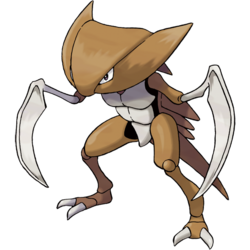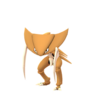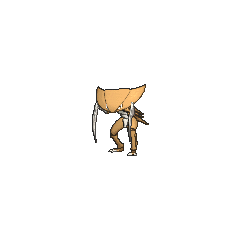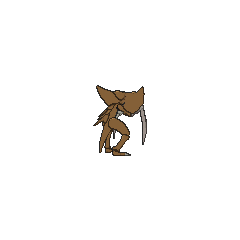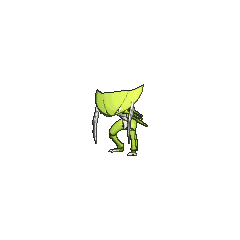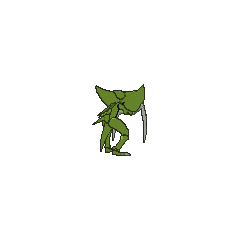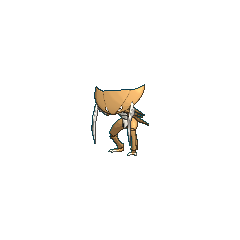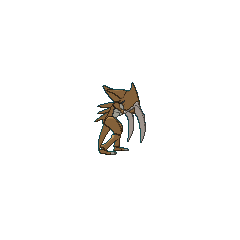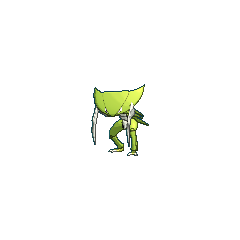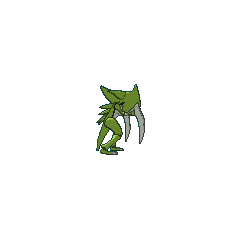Kabutops (Japanese: カブトプス Kabutops) is a dual-type Rock/Water Fossil Pokémon introduced in Generation I.
It evolves from Kabuto starting at level 40, after it is revived from a Dome Fossil.
Biology
Kabutops is a bipedal Pokémon with a skeletal build. It has a flat, half-circular head with a point on each side and two small eyes on the front. It is mostly brown, except for its light gray chest and abdomen. There is a ridge down its back with three flat spines on either side and it has a flat, pointed tail. Instead of hands, its forearms have large, sharp, gray scythes. Its thin legs are brown lead to small feet with two large gray claws.
Before it went extinct, Kabutops was in the process of evolving into a land dweller as evident by changes in its gills and legs. This change is thought to be due to its prey moving onto land as well. In its ocean home Kabutops could tuck up its limbs to help it swim extremely fast, up to roughly 29 knots. It used its sharp scythes to slice enemies and drink their internal fluids.
In the anime
In the main series
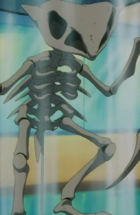
A Kabutops Fossil in the anime
Major appearances
Two Kabutops physically debuted in Attack of the Prehistoric Pokémon. They were some of the Fossil Pokémon that were awakened by a dynamite explosion in Grampa Canyon.
A giant Kabutops appeared in Pokémon Heroes: Latios & Latias, where it was resurrected from a fossil alongside an Aerodactyl by Annie and Oakley. In the English dub, they were once used by an evil Trainer to torment the civilians of Alto Mare, but were drowned when a Latios brought water to the city. It was sent to chase after Ash and Latias. It had blank, yellow-tinted eyes with no pupils and a thick black outline.
A Kabutops appeared in Wild in the Streets!, where it escaped the Oreburgh Mining Museum with the help of a rampaging Aerodactyl. It was briefly captured by Team Rocket, but it was then recalled back into its Poké Ball.
A Kabutops appeared in Dealing With Defensive Types! at the Canalave Gym. When Team Rocket attempted to steal Fossils, Kabutops heard them and chased after them.
Minor appearances
Kabutops appeared in Island of the Giant Pokémon on a theme park island populated with giant mechanical Pokémon.
A Kabutops appeared in the Japanese credits of Pikachu's Rescue Adventure.
A Kabutops Fossil was seen in Fossil Fools.
A Kabutops appeared in the opening sequence of Lucario and the Mystery of Mew.
Dr. Yung used a Mirage Kabutops in The Mastermind of Mirage Pokémon.
A Kabutops appeared in a fantasy in A Gruff Act to Follow!.
Pokédex entries
| Episode
|
Pokémon
|
Source
|
Entry
|
| EP046
|
Omanyte, Omastar, Kabuto, and Kabutops
|
Ash's Pokédex
|
Omanyte and Omastar, Kabuto and Kabutops. It is believed these Pokémon became extinct tens of thousands of years ago. The details of their behavior is shrouded in mystery. Though some have speculated that they may still exist, none of these Pokémon have ever been seen alive.
|
|
In Pokémon Origins
Red used a Kabutops in File 3: Giovanni during his Gym battle against Giovanni.
In the manga
In the Pokémon Adventures manga
Kabutops debuted in Just a Spearow Carrier, used by a Trainer in the Indigo League tournament. It battled Red's Poliwrath, but was quickly defeated.
In Capital Kabutops, Brock was revealed to have a Kabutops in his team. He explained that he met Kabutops as a Kabuto at the Pewter Museum of Science when Pewter City was invaded during the Yellow arc, and had since then become a powerful fighter, employing ancient attacks. It briefly battled Jasmine's Amphy at the Gym Leader tournament at Indigo Plateau, but both Trainers soon swapped their Pokémon.
In Colress Machine, Blake was revealed to own a Kabutops, nicknamed Kabutott.
In the TCG
- Main article: Kabutops (TCG)
Game data
NPC appearances
Pokédex entries
| Generation I
|
|
|
Kanto
#141
|
| Red(ENG)
|
Its sleek shape is perfect for swimming. It slashes prey with its claws and drains the body fluids.
|
| Blue
|
| Yellow
|
A slim and fast swimmer. It slices its prey with its sharp sickles and drinks the body fluids.
|
| Stadium
|
Swims very quickly. It tears at its foe with sickle-like forelegs and drains the foe's body fluids entirely.
|
|
|
| Generation II
|
|
|
Johto
#223
|
| Gold
|
In the water, it tucks in its limbs to become more compact, then it wiggles its shell to swim fast.
|
| Silver
|
With sharp claws, this ferocious, ancient Pokémon rips apart prey and sucks their body fluids.
|
| Crystal
|
It was able to swim quickly through the water by compactly folding up its razor-sharp sickles.
|
| Stadium 2
|
In the water, it tucks in its limbs to become more compact, then it wiggles its shell to swim fast.
|
|
|
| Generation III
|
|
Hoenn
#—
|
|
Kanto
#141
|
| Ruby
|
Kabutops swam underwater to hunt for its prey in ancient times. The Pokémon was apparently evolving from being a water-dweller to living on land as evident from the beginnings of change in its gills and legs.
|
| Sapphire
|
| Emerald
|
Kabutops once swam underwater to hunt for prey. It was apparently evolving from being a water dweller to living on land as evident from changes in its gills and legs.
|
| FireRed
|
It swims freely through water. It catches prey with its scythe-like arms and drains the victim's fluids.
|
| LeafGreen
|
Its sleek shape is perfect for swimming. It slashes prey with its claws and drains their fluids.
|
|
|
| Generation IV
|
|
Sinnoh
#—
|
|
Johto
#228
|
| Diamond
|
It is thought that this Pokémon came onto land because its prey adapted to life on land.
|
| Pearl
|
| Platinum
|
| HeartGold
|
In the water, it tucks in its limbs to become more compact, then it wiggles its shell to swim fast.
|
| SoulSilver
|
With sharp claws, this ferocious, ancient Pokémon rips apart prey and sucks their body fluids.
|
|
|
| Generation V
|
|
|
Unova
#—
|
| Black
|
It is thought that this Pokémon came onto land because its prey adapted to life on land.
|
| White
|
| Black 2
|
It is thought that this Pokémon came onto land because its prey adapted to life on land.
|
| White 2
|
|
|
| Generation VI
|
|
Kalos
#—
|
|
Hoenn
#—
|
| X
|
In the water, it tucks in its limbs to become more compact, then it wiggles its shell to swim fast.
|
| Y
|
A slim and fast swimmer. It slices its prey with its sharp sickles and drinks the body fluids.
|
| Omega Ruby
|
Kabutops swam underwater to hunt for its prey in ancient times. The Pokémon was apparently evolving from being a water-dweller to living on land as evident from the beginnings of change in its gills and legs.
|
| Alpha Sapphire
|
|
|
| Generation VII
|
|
Alola
USUM: #230
|
|
Kanto
#141
|
| This Pokémon has no Pokédex entries in Sun and Moon.
|
| Ultra Sun
|
Its body had begun to change so it could function on land. But it didn't adapt in time and went extinct.
|
| Ultra Moon
|
It swims at speeds of roughly 29 knots, quickly closing in on its prey and slashing into them with its scythes to finish them off.
|
| Let's Go Pikachu
|
A slim and fast swimmer. It sliced its prey with its sharp sickles and drank the body fluids.
|
| Let's Go Eevee
|
|
|
Game locations
In side games
|
|
| Generation II
|
|
| This Pokémon is unavailable in Generation II side games.
|
|
|
|
|
|
|
|
|
|
|
Held items
Stats
Base stats
| Stat
|
Range
|
| At Lv. 50
|
At Lv. 100
|
60
|
|
120 - 167
|
230 - 324
|
115
|
|
108 - 183
|
211 - 361
|
105
|
|
99 - 172
|
193 - 339
|
65
|
|
63 - 128
|
121 - 251
|
70
|
|
67 - 134
|
130 - 262
|
80
|
|
76 - 145
|
148 - 284
|
Total: 495
|
Other Pokémon with this total
|
- Minimum stats are calculated with 0 EVs, IVs of 0, and (if applicable) a hindering nature.
- Maximum stats are calculated with 252 EVs, IVs of 31, and (if applicable) a helpful nature.
- This Pokémon's Special base stat in Generation I was 70.
|
Pokéathlon stats
Type effectiveness
| Under normal battle conditions in Generation IX, this Pokémon is:
|
|
|
|
|
|
|
|
|
|
|
|
|
Learnset
|
|
|
|
- Bold indicates a move that gets STAB when used by Kabutops
- Italic indicates a move that gets STAB only when used by an Evolution of Kabutops
- Click on the generation numbers at the top to see level-up moves from other generations
|
|
|
|
|
- Bold indicates a move that gets STAB when used by Kabutops
- Italic indicates a move that gets STAB only when used by an Evolution of Kabutops
- Click on the generation numbers at the top to see TM moves from other generations
|
|
|
|
|
- Bold indicates a move that gets STAB when used by Kabutops
- Italic indicates a move that gets STAB only when used by an Evolution of Kabutops
- Click on the generation numbers at the top to see moves from other generations
|
|
|
|
|
- Bold indicates a move that gets STAB when used by Kabutops
- Italic indicates a move that gets STAB only when used by an Evolution of Kabutops
- Click on the generation numbers at the top to see level-up moves from other generations
|
|
|
|
|
- Bold indicates a move that gets STAB when used by Kabutops
- Italic indicates a move that gets STAB only when used by an Evolution of Kabutops
- Click on the generation numbers at the top to see TM moves from other generations
|
|
|
|
|
- Moves marked with an asterisk (*) must be chain bred onto Kabutops in Generation VII
- Moves marked with a double dagger (‡) can only be bred from a Pokémon who learned the move in an earlier generation.
- Moves marked with a superscript game abbreviation can only be bred onto Kabutops in that game.
- Bold indicates a move that gets STAB when used by Kabutops
- Italic indicates a move that gets STAB only when used by an Evolution of Kabutops
- Click on the generation numbers at the top to see Egg moves from other generations
|
|
|
|
|
- A black or white abbreviation in a colored box indicates that Kabutops can be tutored the move in that game
- A colored abbreviation in a white box indicates that Kabutops cannot be tutored the move in that game
- Bold indicates a move that gets STAB when used by Kabutops
- Italic indicates a move that gets STAB only when used by an Evolution of Kabutops
- Click on the generation numbers at the top to see Move Tutor moves from other generations
|
|
|
|
|
- Bold indicates a move that gets STAB when used by Kabutops
- Italic indicates a move that gets STAB only when used by an Evolution of Kabutops
- Click on the generation numbers at the top to see moves from other generations
|
Side game data
Evolution
Sprites
Skeletal sprites
Trivia
- In the Pokémon Red and Blue beta, Kabutops was originally known as "Lantis". This is derived from the word "Atlantis".
- Kabutops has a scientific name, Kabutops maximus, which was stated in Fossil Fools. The only other Pokémon with a known scientific name is Oddish, with Oddium Wanderus. The name Kabutops maximus does have a real meaning; when translated, it means "the largest kabuto-face", referring to the size and shape of Kabutops's head.
- Kabutops and its pre-evolution share their category name with Blastoise. They are all known as the Shellfish Pokémon.
Origin
Similar to how Kabuto is based on horseshoe crabs, Kabutops resembles eurypterids, prehistoric arthropods that hunted in seas and rivers and are believed to have been related to modern horseshoe crabs. The large head is also identical to the cephalon in trilobites and the spines down the back resemble their thoracic sections, though the scythes and predatory nature closely resemble eurypterids more. Because of the cross-similarities, it may also be based on the Cheirurus genus of trilobites.
Name origin
Kabutops's name derives from both the Japanese words 兜 kabuto (helmet) and 兜蟹 kabutogani (horseshoe crab). The end of its name may derive from the Greek word ops (face), or it might refer to the living fossil triops or the fact that its helmet is now on the top of its head and no longer covers its whole body.
In other languages
|
|
| More languages
|
 Hindi Hindi
|
काबूटॉप्स Kabutops
|
Transcription of English name
|
 Russian Russian
|
Кабутопс Kabutops
|
Transcription of English name
|
|
|
|
External links

|
This Pokémon article is part of Project Pokédex, a Bulbapedia project that aims to write comprehensive articles on each Pokémon species, as well as Pokémon groups and forms.
|
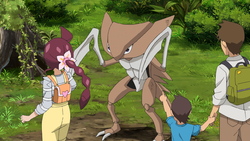
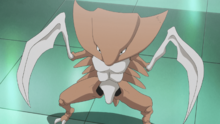
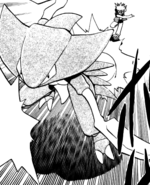
 For other sprites and images, please see Kabutops images on the Bulbagarden Archives.
For other sprites and images, please see Kabutops images on the Bulbagarden Archives.


